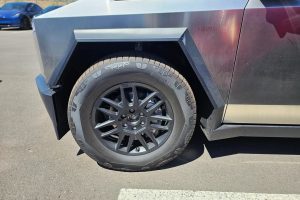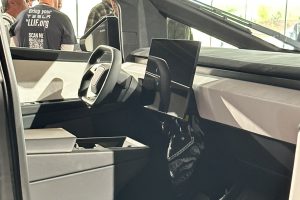- 🛻 Ramzan Kadyrov claims to have received a Tesla Cybertruck with a turret, allegedly disabled by Elon Musk.
- ❌ Elon Musk denies gifting the vehicle to Kadyrov and is surprised by the claims.
- 🔧 Kadyrov accuses Musk of remotely disabling the Cybertruck, calling it an “expensive gift.”
- 😮 Musk expresses disbelief that anyone would think he sent the vehicle to Kadyrov.
- 🚙 Despite the shutdown, Kadyrov notes that two other Cybertrucks are already in combat.
- 🇷🇺 Kadyrov praises the Cybertruck and invites Musk to visit Russia.
In a bizarre tale intertwining the world of tech and politics, Chechen warlord Ramzan Kadyrov has made headlines with his claims of owning a Tesla Cybertruck, allegedly gifted by Elon Musk. According to Kadyrov, the vehicle was equipped with a turret but was remotely disabled by Musk. In this post, we delve into the details of this narrative, exploring the potential realities and fictions involved.
Kadyrov’s Claim: A Gifted Cybertruck?
Ramzan Kadyrov, known for his colorful and controversial persona, has alleged that Elon Musk personally gifted him a Tesla Cybertruck with military modifications, including a turret. He claims that Musk later acted unmanly by disabling the vehicle. The seriousness of these allegations raises numerous questions about the veracity of the claim and the relationship between these public figures.
Key Points of Kadyrov’s Statement:
- Gift from Musk: Kadyrov insists on having received the Cybertruck as a gift.
- Disabling by Tesla: He accused Musk of disabling the Cybertruck, highlighting concerns about remote access.
- Operational Cybertrucks: Despite the alleged disablement, two other units remain active according to Kadyrov.
- Praise for Cybertruck: Kadyrov admired the vehicle’s capabilities and even extended an invitation to Musk to visit Russia.
Musk’s Position: Denial and Disbelief
Elon Musk, no stranger to media controversies, has outrightly denied Kadyrov’s assertions. Expressing disbelief, Musk stated that the idea of gifting such a vehicle to a warlord is absurd.
Musk’s Defense:
- Denial of Gifting: Musk emphatically denies having sent or gifted a Cybertruck to Kadyrov.
- Surprise at the Claims: Musk shared his amazement at the widespread acceptance of this narrative without requisite skepticism.
- No Official Comments from Tesla: The company has not provided an official stance on whether it has the capability to remote-disable vehicles.
Understanding Remote Vehicle Disabling
One of the technological concerns brought to light by this narrative is the potential for Tesla to remotely disable its vehicles. While this capability can be a security feature, ensuring vehicles are not operated unlawfully, it raises concerns about privacy and control.
Key Considerations:
- Remote Access and Control: Does Tesla possess the ability to deactivate vehicles remotely? If yes, under what circumstances can this be considered ethical or legal?
- Data Privacy: What kind of data do Tesla’s vehicles transmit back to the company and how is it used for remote functionalities?
- User Rights: How does Tesla communicate and enforce remote access guidelines to its customers?
The Legend of the Cybertruck Turret
A Cybertruck equipped with a turret sounds like a prop from a sci-fi movie. This raises two coherent questions concerning feasibility and legality.
Feasibility and Legal Concerns:
- Technical Specification: Is it possible to equip a Cybertruck or any consumer vehicle with such military-grade attachments?
- Legal Implications: What are the regulatory challenges or legal ramifications of arming consumer vehicles?
A Global Perspective: Vehicles, Politics, and Corporate Responsibility
The saga underscores the intersection of influential private enterprise with geo-political entities and the broader implications for global security and corporate responsibility.
Broader Insights:
- Corporate Diplomacy: How far should corporations like Tesla go to maintain diplomatic neutrality?
- Ethical Responsibilities: What ethical dilemmas emerge for tech companies operating in geopolitical hotspots?
- Influence of Misinformation: How can misinformation and narrative control sway public perception and relations between states or characters?
Conclusion
While the tale of Musk, Kadyrov, and the turret-mounted Cybertruck stretches credibility to its limits, it does raise important questions about corporate responsibility, remote technological control, and the proliferation of misinformation. Although sensational, the story invites critical examination of the boundaries between innovation, geopolitics, and media integrity.





